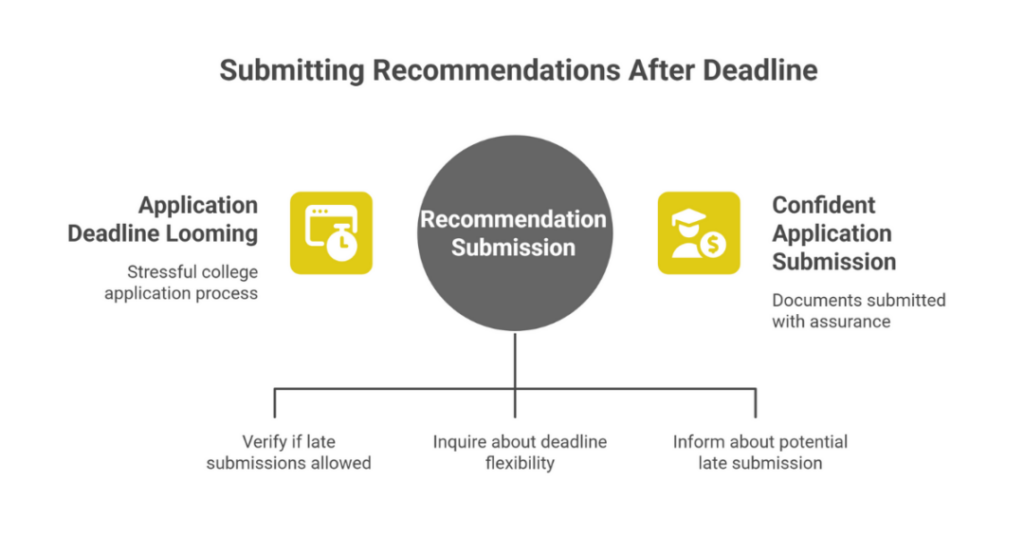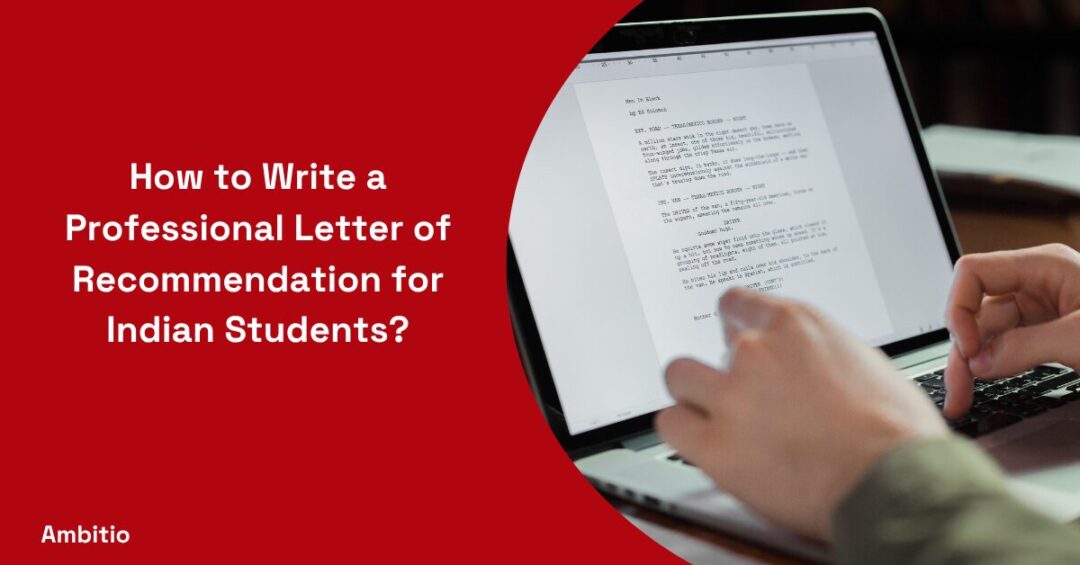23 August 2025
4 minutes read
Can Letters of Recommendation Be Sent After Application Deadline (App Deadline and LOR Required to Submit for Indian Applicants)?

Key Takeaways
- Can letters of recommendation be sent after application deadline depends on each institution’s grace period policy.
- Can letters of recommendation be sent after application deadline if applicants notify admissions and upload all other documents.
- Can letters of recommendation be sent after application deadline is common, so always review portal status and contact the department.
Applying to colleges abroad can be a daunting task, especially if deadlines are lurking around the corner. For Indian applicants, one popular question arises: will letters of recommendation be accepted after the application deadline? Knowing how to approach the scenario can help applicants submit their application documents in confidence.
How to Write a Professional Recommendation Letter for Graduate School Admission?
Did you realize the first academic recommendations dates back long ago, when scholars put their word on the line to vouch for their apprentices? A letter of recommendation for graduate school admission must now follow specific and rigorous guidelines.

Have a professor or faculty member you know well pen the letter, and include as much information about their academic prowess, personal accomplishments and future plans. Letters must be uploaded in a timely manner through the application portal and address the recipients email address.
Can Letters of Recommendation Be Sent After Application Deadline?
Here is an interesting tidbit: Some institutions offer a grace period for documents that are considered missing when submitted post-deadline. Admissions offices often permit recommenders to upload a letter of recommendation just shortly after the submission has closed.
Nevertheless, if a recommender would like to upload a letter of recommendation post-deadline, applicants should notify the admissions office as soon as possible. Always check each program’s policy directly in the application portal!
How to Request a Recommender for an LOR or Interfolio Through Email?
Emails with instructions serve as a workaround for handwritten notes regarding professors references! As applicants ask recommenders for LORs or Interfolio, you should be polite! You should make it very clear and include all relevant contact information.
You will want to remind your recommenders that they will also want their resume, transcript, GPA, statement of purpose, personal statement (even standardized test scores if applicable e.g. GRE, IELTS, TOEFL, SAT, GMAT, ACT); of course not all recommenders will do that. Recommenders should try to upload that documentation as soon as possible through the portal.
Sample Email Template:
- Nicely addressed to the professor
- Coursework Program and department
- Attached resume and academic materials
- Give the recommendation the deadlines and email with instructions
- If it is not working to upload the recommender can send a reminder!
How Many LORs are Required for Submission at Top Universities?
Fun fact: Most universities ask for at least two or three LORs, with a few lucky ones having one or more letters optional for their program. Generally, for top universities, it is important that your letters are from an academic or professional reference who can verify your abilities.
Everything you will need to know will be listed in the requirements inserted in the application materials uploaded to the portal.
Typical LOR Requirements:
| Institution Type | Number of LORs Required | Notes on Policy |
|---|---|---|
| Ivy League Universities | 3 | At least 2 academic and 1 professional |
| Public Research Universities | 2 | Faculty references preferred |
| Business Schools | 2–3 | Professional letters encouraged |
How Can I Submit My Application Even if One of My Recommenders are Yet to Submit Their Letter?
Interesting Information: application systems are built so that students can submit their application even when one of my recommenders hasn’t uploaded their L.O.R. If they haven’t uploaded it by the deadline, applicants should still upload everything else such as their resume, transcript, statement of purpose and personal statement.
Admissions Offices read files shortly after they are submitted and will be able to match outstanding documents at a later time.
Follow these steps:
- Submit your application even before all your LORs are submitted.
- Notify the admissions office as soon as possible.
- Send a prompt reminder to the recommender.
- Check the status through the application portal.
- Follow up with the department regarding letters that are still pending.
Conclusion
For Indian students applying to universities, it can be quite overwhelming to understand deadlines, applying all the appropriate items, and dealing with recommenders. Universities often have sensible solutions to your problems if only you communicated clearly.
Always review and notify the admissions office, take regular looks at the policies for changes, and that the letters must reach them as quickly as possible. Reach out to Ambitio today for support for personalized study abroad advice about your future.
FAQs
Can letters of recommendation be sent after application deadline for graduate programs?
Yes, can letters of recommendation be sent after application deadline depends on the institution’s policy, and some universities may allow a short grace period.
Can letters of recommendation be sent after application deadline if my recommender is unable to submit on time?
Yes, can letters of recommendation be sent after application deadline if you promptly inform the admissions office and request your recommender to upload directly.
Can letters of recommendation be sent after application deadline through the application portal?
Yes, can letters of recommendation be sent after application deadline through the application portal, as many institutions allow recommenders to upload shortly after submission.
Can letters of recommendation be sent after application deadline if I already submitted my other application materials?
Yes, can letters of recommendation be sent after application deadline even if your transcript, resume, GPA, and statement of purpose are already submitted.
Can letters of recommendation be sent after application deadline via Interfolio?
Yes, can letters of recommendation be sent after application deadline through Interfolio if the university accepts it and matches it to your file.
Can letters of recommendation be sent after application deadline for optional supporting documents?
Yes, can letters of recommendation be sent after application deadline for optional materials, though required letters must still arrive as soon as possible.
Can letters of recommendation be sent after application deadline if I contact the department directly?
Yes, can letters of recommendation be sent after application deadline if you contact the department directly and request guidance on their submission policy.

You can study at top universities worldwide!
Get expert tips and tricks to get into top universities with a free expert session.
Book Your Free 30-Minute Session Now! Book a call now




























